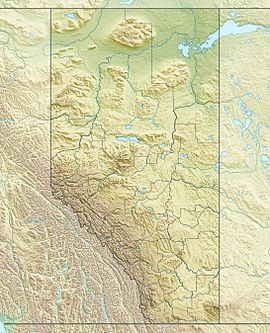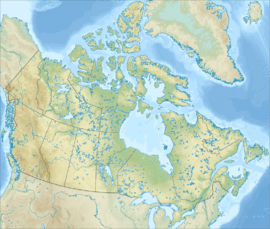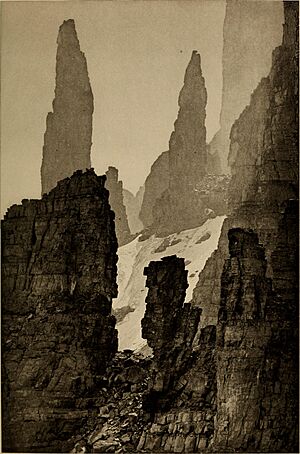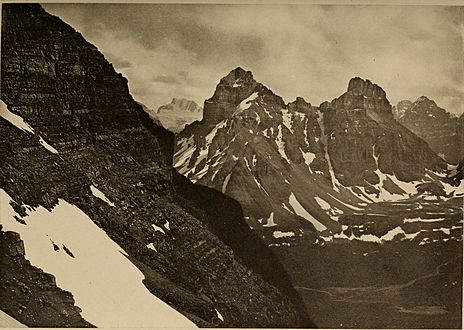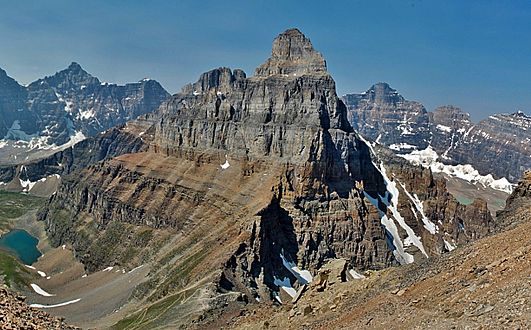Pinnacle Mountain (Alberta) facts for kids
Quick facts for kids Pinnacle Mountain |
|
|---|---|
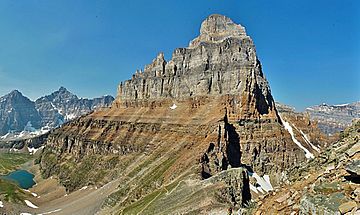
Pinnacle Mountain
|
|
| Highest point | |
| Elevation | 3,070 m (10,070 ft) |
| Prominence | 225 m (738 ft) |
| Listing | Mountains of Alberta |
| Geography | |
| Location | Alberta |
| Parent range | Bow Range Canadian Rockies |
| Topo map | NTS 82N/08 |
| Geology | |
| Age of rock | Cambrian |
| Type of rock | Sedimentary rock |
| Climbing | |
| First ascent | 1909 J.W.A. Hickson, E. Feuz Jr, R. Aemmer |
Pinnacle Mountain is a tall mountain in Banff National Park in Alberta, Canada. It stands about 3,070 meters (10,072 feet) high. It's part of the Bow Range, which is a smaller mountain group within the larger Canadian Rockies. The closest taller mountain is Eiffel Peak, about 1 kilometer (0.6 miles) away to the southwest. Mount Temple is right next to Pinnacle Mountain on its northeast side. A low point called Sentinel Pass connects the two mountains.
Mountain History
Pinnacle Mountain got its name in 1894 from Walter Wilcox. He named it because of the tall, pointy rock formations, called 'pinnacles,' near Sentinel Pass.
Walter Wilcox wrote about these amazing rock formations in his 1896 book, "Camping in the Canadian Rockies." He described them as looking like "minarets, spires, and pinnacles," almost like parts of a "great cathedral." He was amazed by how these slender towers had lasted for thousands of years.
Before anyone successfully climbed Pinnacle Mountain, three other attempts failed. The first ascent was finally made in 1909 by J. W. A. Hickson. He was guided by Edward Feuz Jr. and Rudolph Aemmer. The mountain's name was officially recognized in 1952 by the Geographical Names Board of Canada.
Mountain Makeup
Like other mountains in Banff Park, Pinnacle Mountain is made of sedimentary rock. This type of rock formed from layers of sand and mud that settled in ancient shallow seas. These layers were laid down during the Precambrian to Jurassic periods, which means they are very, very old.
Later, during a time of major mountain building called the Laramide orogeny, these rock layers were pushed up and over younger rocks. The Grand Sentinel is the largest of the pinnacles on the mountain. This tall quartzite tower stands 120 meters (394 feet) above the slopes on the Paradise Valley side of Sentinel Pass.
Mountain Weather
Pinnacle Mountain is located in a subarctic climate zone. This means it has very cold, snowy winters and mild summers. Temperatures can drop below −20°C (−4°F). With the wind chill, it can feel even colder, sometimes below −30°C (−22°F).
Gallery
-
Pinnacle Mountain and Eiffel Peak photographed by Walter Wilcox from Mount Aberdeen, likely during his first ascent in 1894
Images for kids


